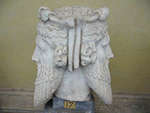
Janus
Janus :: The Roman God of Doorways and Beginnings
In Roman mythology, Janus held a unique and significant place as the god of beginnings, transitions, and passages. His dominion over these aspects of life made him one of the most important and revered deities in the Roman pantheon.
The Two Faces of Janus
Janus was famously depicted as having two faces, each looking in opposite directions. This imagery symbolized his ability to see both into the past and into the future, embodying the concept of transition and time. This dual-faced representation was unique to Janus, setting him apart from other Roman and Greek gods.
The Guardian of Doorways
As the god of doorways, gates, and passages, Janus was often invoked at the beginning of important events, journeys, and ceremonies. He was seen as the protector of the threshold, both in a literal and metaphorical sense, overseeing all beginnings and endings.
Janus' Role in Roman Culture
Janus played a pivotal role in Roman culture and religion. He was not only associated with physical transitions but also with more abstract forms of change, such as the transition from war to peace. In the beginning of the world, he was believed to have guarded the gates of Heaven. Additionally, he presided over the creation of religion, life, and the gods themselves. Janus' name was invoked first in prayers and rituals, a practice that underscored his primacy in Roman worship.
Janus and the Creation of the World
According to Roman mythology, Janus was present at the very beginning of the world. He was often associated with the concept of creation and was believed to have a hand in the birth of the gods, the universe, and the human world.
Janus and Romulus
In Roman lore, Janus played a crucial role in one of the foundational myths of Rome. During the incident of the kidnapping of the Sabine women by Romulus and his men, Janus intervened to protect the women. He created a volcanic hot spring that erupted, thwarting the kidnappers with a deluge of boiling water and volcanic ash. This myth highlights Janus' protective and just nature.
Legacy of Janus
Janus' legacy in Roman culture is profound. His influence extended beyond religion into various aspects of daily life, including war, peace, and social transitions. The month of January, the beginning of the new year, is named after Janus, symbolizing his role as the god of beginnings and transitions.
See Also: Romulus
Janus Video
Janus Q&A
Janus Associations
Link/Cite Janus Page
Written by: The Editors of GreekMythology.com. GreekMythology.com editors write, review and revise subject areas in which they have extensive knowledge based on their working experience or advanced studies.
For MLA style citation use: GreekMythology.com, The Editors of Website. "Janus". GreekMythology.com Website, 30 Nov. 2023, https://www.greekmythology.com/Myths/Roman/Janus/janus.html. Accessed 27 April 2024.

